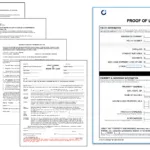Filing a homeowners or property insurance claim can be frustrating and complicated. It’s not something you do every day, and it’s subject to nuanced and hard to understand state laws and regulations, as well as complicated policy terms. Florida is especially complicated for many reasons, including recent changes to the insurance law. Florida has the second highest monetary amount of damages from natural disasters and weather events since 1980, so it’s no wonder that insurance rates are high, there are a lot of claims, and the state legislature wants to get their hands in the required processes – sometimes for thebenefit of policyholders, sometimes at the request of insurance companies and their lobbyists. There is some good news, though, Florida regulations provide some protection and guidelines for policyholders, and set forth a relatively streamlined timeline for claims processing and payment. If policyholders are aware of these deadlines and rules, and are proactive with respect to their claims, they should have a smooth, fast, efficient, and fair insurance claim process.
These resources are built to help policyholders — and all the stakeholders who work with them, like adjusters, attorneys, contractors, and consultants. These resources will help you file your claim correctly, document your losses thoroughly, and know when and how to followup through the claim process. And, if necessary, how and when to escalate and resolve the claim.
Filing Deadline
1 Year
In Florida, the ultimate deadline to make a property insurance claim is 1 year from the date of loss (or 18 months from the date of loss with respect to a supplemental claim). However, it is generally best practice to report a property damage claim as soon as you believe a covered loss has occurred, within reason.
Initial Response Time
7 days
Florida law requires that the insurance company acknowledge the claim, and provide the policyholder with instructions and any required forms within 7 days of receiving the first notice of loss.
Claim Decision Time
60 Days
Florida requires that, absent factors beyond the control of the insurer, that the insurer must accept and pay or deny the claim within 60 days of the initial notice of the claim.
Lawsuit Deadline
5 Years
Generally, the deadline in Florida to file suit pursuant to a property insurance policy is 5 years from the date of the loss. Note, however, that Florida requires a specific written Notice of Intent to Initiate Litigation to be provided at least 10 days prior to filing suit..
State Department
Florida Department of Insurance
200 East Gaines Street
Tallahassee, FL 32399
Florida CFO Div. of Insurance website
File your Claim Now with ClaimSpot
ClaimSpot guides you through a quick, secure, and effortless filing experience.
It’s free. Let ClaimSpot Make Your Claim Fast & Easy.
Florida Insurance Claim Guide
Florida Insurance Frequently Asked Questions
These resources are specifically built to help policy holders, as well as the stakeholders that they work with. Below, you can find information that you can use to help make sure your claim is handled correctly from beginning to end, and learn the deadlines that you and your insurance company need to follow in order to ensure that your claim is processed smoothly, quickly, and efficiently. And, if necessary, how and when to escalate your claim and get paid.
In Florida, all that needs to happen to initiate a property insurance claim is to contact the insurer and inform them of the loss and that a claim is being made. This communication can be called a first notice of loss, making/filing a claim, or something else – the key is to ensure the insurance carrier knows the property is damaged and a claim is being made.
Most insurance companies provide multiple ways to contact them after a loss to begin the claims process, these usually include:
a. Phone call (a number is usually provided on the insurance company’s website);
b. Online portal – many insurance companies have an online form to notify the claims department of a loss, this may even be through a mobile app;
c. Your agent – many insurance companies even have a different section of their website or phone number for an agent to inform them of a policy-holder’s loss;
d. Online software as a virtual assistant.
While the claims process can be started with just a quick communication to the insurer, the insurer will likely want or need more information and supporting documentation, including specific forms. Luckily, Florida law requires that the insurance company acknowledge the claim, and provide the policyholder with instructions and any required forms within 7 days of receiving the first notice of loss.
Some things are pretty much universally the best practice after your property suffers damage. Whenever property damage occurs, and it looks like a claim under the insurance will be necessary, the insured should take steps to help ensure the claim processing will go smoothly. These steps include:
1. Mitigate the damage, as soon as it is reasonable. This means protect the property and secure it against further damage when it is safe and possible to do so. Mitigation should only be just trying to keep the damage from getting worse, it does not mean that it is a good idea to jump directly into substantive repairs.
2. Inform the insurance carrier of the damage.
3. Determine if the covered damage exceeds the policy deductible by an amount sufficient to make a claim.
4. Cooperate with your insurance company, inspectors/adjusters, and other interested parties and communicate with them (and keep copies of all correspondence).
5. Make your property available for inspection as soon as it is safe and possible to do so.
– Prepare supporting documents for your claim including: Inventory list;
– Description of damages;
– Photographs and/or videos of the damage;
– Receipts; etc.
Reporting Deadline: Technically, in Florida, the ultimate deadline to make a property insurance claim is 1 year from the date of loss (or 18 months from the date of loss with respect to a supplemental claim). However, it is generally best practice to report a property damage claim as soon as you believe a covered loss has occurred, within reason. Insurance policies often require notice of loss within a reasonable amount of time, and it is not a good idea to let a potential claim sit around, as a failure to timely notify the insurance carrier of the loss can be used to deny the claim.
Documentation Deadline: Florida statutes don’t specify a specific deadline by which support for a claim, including providing a Proof of Loss document, must be submitted. However, many policies contain specific deadlines for providing support or other responsive documentation, usually not longer than 60 days.
Note, however, that Florida requires a property insurance company to begin the investigation of a property insurance claim based on when a Proof of Loss document is submitted. So, along with being a good practice to submit support for the claim as soon as possible, providing an appropriate Proof of Loss starts the clock for important deadlines that the insurance company must meet, and is a good way to get the claim moving.
Deadlines for Acknowledgment: Florida has strict and, to the benefit of policy holders/claimants, relatively short timing requirements that insurance companies must adhere to with respect to property insurance claims.
Generally, absent extenuating circumstances out of the insurers control, a Florida property insurer must a) acknowledge receipt of your claim; and b) provide instructions and all required forms to the claimant, within 7 days of receipt of the first notice of loss.
Deadlines for Adjustment: Generally, and absent factors beyond the control of the insurer, the insurer shall begin such investigation as is reasonably necessary to process the claim within 7 days after an insurer receives a satisfactory Proof of Loss statement.
Additionally, if the insurer determines that a physical inspection of the property is required, the inspection must be accomplished within 30 days of the receipt of the Proof of Loss, again absent circumstances out of the insurer’s control that make the deadline impossible. Also, the insurer must send the policyholder a copy of any detailed estimate of the amount of loss prepared by their adjuster within 7 days of when the estimate is generated.
Deadline for Acceptance/Denial & Payment: Florida requires that, absent factors beyond the control of the insurer, that the insurer must pay or deny the claim within 60 days of the initial notice of the claim. Additionally, Florida insurance law requires that the insurer provide a written reasonable explanation of why the claim was accepted, denied, or partially denied, or why the insurer’s claim payment is less than specified in any insurer’s detailed estimate of the amount of the loss if that is the case.
If the policyholder and the insurance company agree in writing to a settlement of the claim, the insurance company must pay pursuant to the terms of the settlement agreement within 20 days after such settlement is reached. However, if the settlement is contingent upon the policyholder signing a release, the 20-day period begins to run from the date on which the release was signed. If the payment is not made on time pursuant to this deadline, the insurer must pay interest on the settlement amount at 12% per year from the date of the agreement.
If an insurance company is determined to be in violation of the deadlines above, they can be required to pay the claimant interest on the claim beginning from the date they were first notified of the claim. Or in the case of a settlement, pay interest beginning on the date of the settlement.
Deadlines to File Suit: Provided an ongoing dispute exists with respect to the payment of the claim, a policyholder may need to file suit against the insurance carrier. Generally, the deadline to file suit pursuant to a property insurance policy is 5 years from the date of the loss. Note, however, that Florida has some unique requirements with respect to filing suit against a property insurer, and specific steps must be taken and deadlines met, or the suit could be dismissed.
The first thing that must be addressed is whether filing suit in court is even allowed. Florida allows insurance policies to be subject to mandatory arbitration but only if several specific criteria are met:
“(1) The mandatory binding arbitration requirements are contained in a separate endorsement attached to the property insurance policy.
(2) The premium that a policyholder is charged for the policy includes an actuarially sound credit or premium discount for the mandatory binding arbitration endorsement.
(3) The policyholder signs a form electing to accept mandatory binding arbitration. The form must notify the policyholder of the rights given up in exchange for the credit or premium discount, including, but not limited to, the right to a trial by jury.
(4) The endorsement establishes that an insurer will comply with the mediation provisions set forth in s. 627.7015 before the initiation of arbitration.
(5) The insurer also offers the policyholder a policy that does not require that the policyholder participate in mandatory binding arbitration.
Provided that filing suit is allowed, there are additional strict requirements that must be met. A claimant must provide a specific written “Notice of Intent to Initiate Litigation” to Florida’s CFO through a specifically created online filing system, and sent to the insurer via a specifically designated email address. Note, that this notice of intent is public record and is displayed on the Florida Dept. of Financial Services website and can be viewed by the public. This notice must be provided at least 10 days prior to filing suit, but not before a determination of coverage has been made by the insurer. The notice must include the following information, with specificity:
“1. That the notice is provided pursuant to this section.
2. The alleged acts or omissions of the insurer giving rise to the suit, which may include a denial of coverage.
3. If provided by an attorney or other representative, that a copy of the notice was provided to the claimant.
4. If the notice is provided following a denial of coverage, an estimate of damages, if known.
5. If the notice is provided following acts or omissions by the insurer other than denial of coverage, both of the following:
a. The presuit settlement demand, which must itemize the damages, attorney fees, and costs.
b. The disputed amount.”
Finally, Florida also provides a separate mechanism that may be used to reach agreement over policy and coverage disputes. Non-binding alternative dispute resolution / mediation may be initiated in an attempt to resolve the dispute without resorting to costly litigation. The procedures and requirements of such alternative resolution are set forth by Florida statute.












